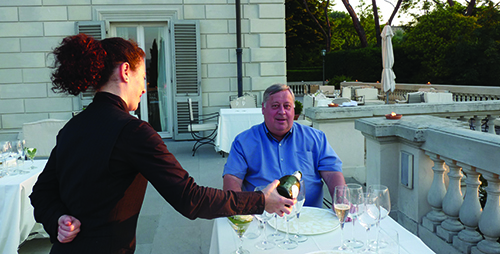Spring 2020 (Volume 30, Number 1)
Retirement: “Goodbye to All That”
Reflections of a recent retiree
(– not Robert Graves’!)
By Paul Davis, MB, ChB, FRCP(UK), FRCPC
Download PDF
It’s 7:00 am Monday morning. It’s still dark outside and it’s raining. It’s the beginning of another work week. But wait, not this week; you’ve just retired. You lie in bed trying to enjoy the extra relaxation time, but guilt begins to creep up on you until you feel obliged to rise. You shave and shower, but when all is said and done, you’re still retired!
It’s important to recognize that the transition into retirement is no less challenging than your previous transitions from student to resident, to fellow and to consultant. There is, however, one critically important difference because, unlike previous experiences which were undertaken to enhance one’s professional status, this one requires you to say “goodbye to all that” and plan for a new future.
There are many publications written on how to handle retirement, but I haven’t read any of them. This is largely because I believe it to be a very personal transition that cannot be resolved by any one formula. There are, however, some common stages that have to be addressed. The first stage is accepting that all which has filled your professional life for 40 years is now gone (the bereavement phase). This will manifest itself in many different ways. Not surprisingly, the first is the loss of contact with colleagues and patients, but don’t be surprised if you miss them less than you thought you ought to. There will be no meetings to attend and, therefore, no agendas and minutes to review. Invites to sit on advisory panels will cease, as will invitations to present at professional meetings. There will be no research grants to be applied for and no papers to write or present. (However, you may get an invite to write an article for the CRAJ!). Your once over-loaded e-mail inbox will dry up to the extent that you wonder whether the server is down. Some e-mails will still get through, including requests to participate in on-line surveys despite replying “unsubscribe” or “no longer in practice.” Offers of cut-price male enhancement pills will still appear. (I’ve often wondered how they know I need them). During this time if you are ill-advisedly tempted to pop back to work and see how they’re managing without you, you will find that your name has been removed from the door and someone else has already occupied your old office. People may stop to ask you how you’re enjoying your retirement but move on before you have a chance to reply! The secret of successful transition through this stage is to realize that this is NOT the end but an opportunity for a new and fulfilling beginning.
The next stage of the transition is characterized by the realization that you have something you had little of before, and that is time for yourself (recovery phase). Effective utilization of this time is critical. It’s not how you fill it that matters, providing you do so. There are many strategies and opportunities which will be very personal in nature. One approach is to do what Jack Nicholson’s character did in the movie and develop a “bucket list.” I personally drew the line at sky diving but did consider getting a tattoo! Now is the time to read a book or even write one; to start a new hobby or reactivate an old one; to make new friends or reconnect with past ones; to volunteer; to enroll in classes; to take the dog for a walk (if you don’t have one, go anyway); to do the crossword; and to plan trips abroad even if you don’t go on them. Social media provide a good source of entertaining and educational material providing you are selective. If you find yourself watching hospital soaps on TV, you have a problem and urgent desensitization is required.
When making your choices, it’s important to acknowledge that your retirement plans are likely to affect other people, most notably your partner. Someone once said that “retirement is coming home from work and saying honey I’m home–forever”. Don’t be surprised if the response is not one of unbridled enthusiasm. A colleague’s wife once confided in me that she dreaded her husband’s retirement because he would just get in the way! If you do find that you have time to spare, brownie points can be obtained by learning how to load and unload the washer and dryer, or how to efficiently stack the dishwasher. Helping with the shopping and cooking is often appreciated and in itself can be quite therapeutic. However, in this rush of domesticity, beware asking the question “is there anything I can do?” as you might get more than you bargained for.
In conclusion, is there any way to summarize how to handle this pivotal transition into retirement and effectively and painlessly say “goodbye to all that”? I think the advice of Lord Baden-Powell says it all–“Be Prepared.”

Dr. Paul Davis working in Italy.
Paul Davis, MB, ChB, FRCP(UK), FRCPC
Emeritus Professor of Medicine,
University of Alberta
Edmonton, Alberta
|
